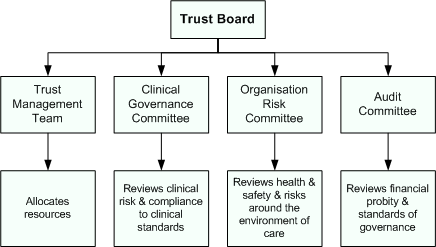WHAT'S INVOLVED?
Risk Management ... Incident Reporting ... Patient & Public involvement ... Concerns ... Clinical Audit ... Research and Development ... Training
Risk Management
Risk management involves everybody.
The Trust has systems for reporting and investigating hazards, risks, incidents, complaints and claims.
To ensure Risk Management in the Trust works efficiently, and information on risk flows in both directions there are three sub-committees reporting to the Board, with different types of risk being overseen by each of them.

For further information see: Policy number PP[02]093 – Policy & Strategy for Risk Management
Incident Reporting
The Trust has a policy for reporting all incidents and near misses that occur in the Trust.
The incident reporting system allows us to identify risks and work towards safer work practice and a safer working environment for all.
The Trust aims to take an integrated approach to learning from all incidents in order to improve and assure its services, whether clinical or non-clinical. It recognises that such learning can only take place in a non-threatening environment and that the fear of disciplinary action may defer staff from reporting an incident. The view of the Trust is therefore that reported adverse events or near misses will NOT normally lead to disciplinary action.
For further information see: Policy number PP[02]105 Incident Reporting and management
To report an incident:
· Find the incident book in your workplace
· Read the notes on the inside front cover
· Report the incident to the senior person on duty in your area straight away!
· Fill in the form (using the instructions) and take it to the person you’ve reported it to. They will start the investigation process.
· Once the investigation is over, you will get a copy of the final report back. This will tell you what actions have been taken
If you have any questions – phone the Risk Office
(01284 7133949)
Patient & public involvement
As users of the service it is important we consider the patient and the publics’ views on how we deliver their care.
The Trust acts in partnership with many patient representative groups. e.g.
- Community Health Council (CHC)
- Patient Advocacy Liaison Service (PALS)
- Patient & Public Partnership & Participation (PPPP)
- Patients & Clinical Partnerships group (PCP)
Information for staff and patients
Information comes in all shapes and sizes. e.g.
· Patient information leaflets
· Staff information leaflets
· Trust & Department databases
· The Green Sheet
· “Up and About”
· The Intranet
Communication is really important – we must talk to each other
How to raise concerns
During our working lives there are times when we either observe something that worries us or something happens to us that is upsetting.
A booklet is available that provides staff with a quick and easy reference to the policies they can use to raise a concern, together with contact names and numbers for people they can go to for help.
Note: You will find further information on Concerns and How to make a complaint in the PALS section of this web site.
Clinical audit and effectiveness
Clinical Audit allows us to examine clinical practice against standards (e.g. those set by NICE). Where standards are not being met action plans need to be put in place to ensure patient care is clinically effective.
Before starting a clinical audit please register with the governance co-ordinators.
Documentation: This can be found here (on the documentation page)
Research and development
The Trust has a R&D manager who’s job is to make sure all research taking place within the Trust is safe, ethical and useful to the health care of future patients.
Training
Available to all staff groups. Specific courses tailored to individual staff groups and Trust-wide training.
|
IN THIS SECTION |
| Introduction |
| Clinical Governance |
| What's Involved |
| Clinical Guidelines |
| Documentation |
| Contacts |
|
Note that you can find all the documents relating to to the sections on this page on the documentation page. |
| West Suffolk Hospitals NHS Trust |
Last Modified: July 2002 |
|
|
|
